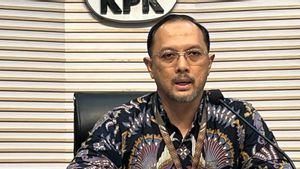JAKARTA - A Swedish-Iranian national sentenced to death in Iran on charges of spying for Israel will be executed on May 21, Iran's semi-official news agency ISNA said on Wednesday, during the trial of a former Iranian official suspected of war crimes. ended up in Sweden.
Ahmadreza Djalali, a doctor and researcher in disaster medicine, was arrested in 2016 while on an academic visit to Iran. The Iranian court did not immediately comment on ISNA's report that Djalali faced execution later this month.
"Sweden and (the EU) condemn the death penalty and demand that Djalali be released," Swedish Foreign Minister Ann Linde said on her Twitter account.
"We have repeatedly stated this to Iranian representatives. We are in touch with Iran," he continued.
The announcement came shortly before the trial of Hamid Noury, a former Iranian prosecution official who was arrested by Swedish authorities in 2019, ended in Stockholm. The verdict will be announced on July 14.
If found guilty, Noury faces the maximum life sentence on charges of international war crimes and human rights violations.
Noury is accused of playing a major role in the killing of political prisoners executed on government orders at Gohardasht prison in Karaj, Iran, in 1988.
Amnesty International has put the number executed at around 5,000, saying in a 2018 report that "the real number could be higher".
Under Swedish law, courts can try Swedish nationals and other nationals for crimes against international law committed abroad.
On Monday, Iran's Foreign Ministry summoned the Swedish envoy to protest the "baseless and fabricated accusations made by Swedish prosecutors against Iran during the Noury court case", Iranian media reported earlier.
Last year, UN investigators on human rights in Iran called for an independent investigation into allegations of the 1988 state-ordered execution and the role played by then-President Ebrahim Raisi as deputy prosecutor.
President Raisi, when asked about the allegations, told reporters after his election in June last year that he had defended national security and human rights.
In Iran, Djalali is accused of providing information to Israel to help kill several senior nuclear scientists. His wife denies the accusations. Iran's Supreme Court upheld the death penalty and Djalali went on a hunger strike in protest at his "forced confession".
Iran's Revolutionary Guards have arrested dozens of dual nationals in recent years, mostly on espionage charges. Human rights activists accuse Iran of using them as a bargaining chip. Iran, which does not recognize dual citizenship, denies taking prisoners to gain diplomatic clout.
However, Iran is also known to have exchanged several foreigners who were imprisoned and dual nationals with Iranians detained abroad.
The English, Chinese, Japanese, Arabic, and French versions are automatically generated by the AI. So there may still be inaccuracies in translating, please always see Indonesian as our main language. (system supported by DigitalSiber.id)









